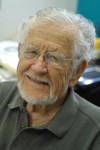John Roberts never held back when he thought a colleague or friend was wrong.
Roberts, a pioneering researcher in organic chemistry at the California Institute of Technology and 1941 UCLA alumnus died on Oct. 29 of a stroke. He was 98.
Harry Gray, a chemistry professor at Caltech, first met Roberts when was writing his first book, which he sent to Roberts for review.
Gray was shocked when Roberts returned the manuscript covered in red marks.
“You really had to shape up to impress him,” Gray said. “But in the end he was a real sweetheart, and everybody got to just love him.”
After receiving both his bachelor’s and doctoral degrees from UCLA in 1941 and 1944, respectively, Roberts moved east to teach chemistry at Harvard University and then the Massachusetts Institute of Technology.
In 1953, Roberts returned to Southern California to become a professor at Caltech, where he worked for over 60 years.
Throughout his life, Roberts had enormous pride in his UCLA degree, Gray said.
“He loved the place and kept up with everything there,” Gray said. “He was a real Bruin.”
Peter Dervan, a chemistry professor at Caltech, said he was honored Roberts chose to come back to Southern California.
“UCLA should feel very proud,” Dervan said. “We at Caltech were the lucky beneficiaries of his fabulous career.”
During this time at Caltech, Roberts made a number of scientific discoveries that shaped modern organic chemistry. He worked closely with nuclear magnetic resonance spectroscopy to reveal the structure of organic molecules and understand chemical reactions, Dervan said.
Roberts also wrote more than 540 papers and several books, including one about molecular orbital theory.
“One of the hallmarks of (Roberts) was his great writing – his deep understanding of great technical writing,” Gray said.
However, Gray said he thinks Roberts’ greatest achievement was his discovery of the benzyne which many scientists did not believe existed.
“Nobody believed it initially, but subsequent work has shown that all of his work there was correct,“ Gray said. “His work made a big difference looking at organic mechanisms.”
Jacqueline Barton, the chair of the chemistry department at Caltech, said she thinks one of Roberts’ strengths was his ability to explain complicated concepts in a way that was easy to understand.
Barton said she first encountered Roberts’ work as a college student, when she read his textbook, Basic Principles of Organic Chemistry.
In October, Caltech hosted a reception to celebrate the 500,000th download of the book.
“People all over the planet – from China to Korea to Russia – all over the world, people have downloaded this book for free,” Dervan said.
Barton said Roberts was very proud of his work as an educator, and tried to make chemistry more accessible.
In 1953, Roberts persuaded Caltech administrators to admit its first female graduate student, Dorothy Semenow.
Semenow received her doctoral degree in 1955, 15 years before Caltech began admitting undergraduate female students.
“He was a great educator,” Barton said. “He cared deeply about educating young women, particularly in the sciences.”
Dervan said he thinks Roberts may seem intimidating at first because of his impressive resume, but underneath his gruff exterior, he was actually a warm and generous person.
“I think it was a way of testing you,” Dervan said. “When one got to know him on a personal level, we began to realize that he had a heart of gold.”
Outside of his scientific work, Roberts was known as an avid skier and tennis player, Dervan said.
“He played all these sports up until he was in his high 80s at least, so he was quite a remarkable guy,” Gray said.
Dervan added Roberts was also an active philanthropist with his wife Edith, who died in 2010. Over the course of their 68 years of marriage, they were particularly supportive of the Pasadena Symphony. Roberts was a great music lover and often attended performances in Downtown Los Angeles and Pasadena.
Dervan said he thinks that though Roberts tackled many scientific issues over the course of his life, his willingness to use new methods to approach problems was his most remarkable quality.
“It was keen insight on his part to realize that if you have a new tool to open doors and push back frontiers of ignorance on scientific issues, you accelerate discovery,” Dervan said. “Many of us in life don’t step through those doors, but (Roberts) did.”
